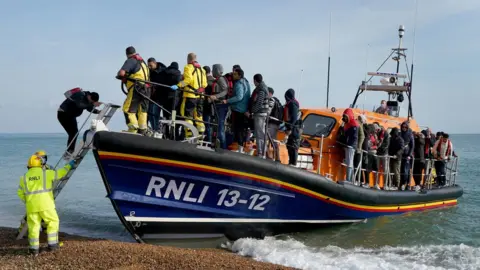Windsor Framework: Migration Act faces challenge from human rights group
 Gareth Fuller/PA Media
Gareth Fuller/PA MediaThe government's Illegal Migration Act is facing a court challenge from the Northern Ireland Human Rights Commission (NIHRC) on the ground that it breaches the Windsor Framework.
The framework is the revised post-Brexit deal for NI, which was agreed by the UK and EU earlier this year.
It deals mostly with trade issues but also includes a human rights element.
It commits the UK not to water down the human rights provisions that flow from the Good Friday Agreement.
The move from the NIHRC comes as the Home Secretary Suella Braverman prepares to address the Conservative party conference.
Her speech is expected to touch on migration issues.
Since January 2021, the NIHRC has had powers to monitor, advise and enforce the UK Government's human rights commitments which are covered by Article 2 of the framework.
The Illegal Migration Act is central to the prime minister's pledge to stop small boats crossing the English Channel.
Under the new law the home secretary has a legal duty to detain and remove anyone entering the UK illegally.
The centrepiece of the plan - sending migrants to Rwanda - can't happen yet as it has been challenged at the Supreme Court, with a ruling due before the end of the year.
While the legislation was going through Parliament, the NIHRC advised the government that it believed the law was incompatible with obligations set out in Article 2 of the framework.
It also advised that it was incompatible with the European Convention on Human Rights and other international standards.
Last resort
Alyson Kilpatrick, chief commissioner of the NIHRC, said that taking the legal action was "a measure of last resort, but a necessary step".
"We are concerned that the Act will effectively make it impossible for people who arrive in the UK irregularly to present as refugees," she added.
"The act creates sweeping new detention powers, with limited judicial oversight. Proposed removal of vulnerable people seeking refuge to a third country without a guarantee of them necessarily accessing protection is deeply problematic."
A government spokesperson said: "Tackling illegal migration is a top priority for the government, and there are an unacceptable number of people risking their lives, making dangerous crossings on small boats.
"The Illegal Migration Act will play an important part in our collective effort to break the cycle, end exploitation by gangs and prevent further loss of life."
This is the first challenge to the government under Article 2 and is taking the form of an application for judicial review at the High Court in Belfast.
It is understood that the government regards the claim as speculative and will argue there is no basis for asserting that the act has diminished any of the rights under Article 2.
If the NIHRC should ultimately win its case it could see the disapplication of parts of the law in Northern Ireland.
A similar case is already in its preliminary stages.
Last month, the Belfast solicitors Phoenix Law issued proceedings against the home secretary on behalf of a minor asylum seeker who arrived on a small boat.
His legal representatives are awaiting a case management direction from the court.
